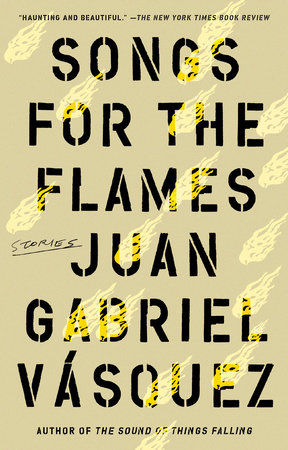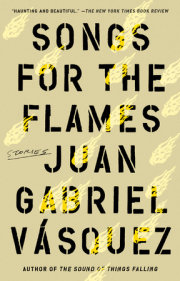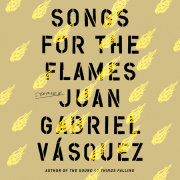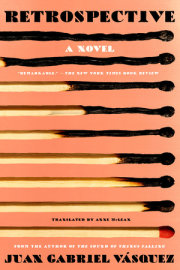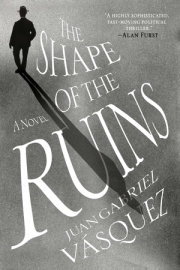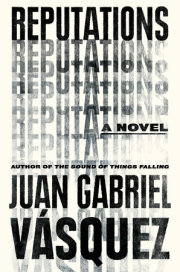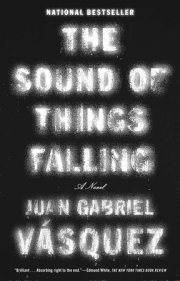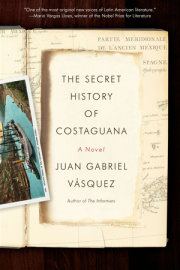I
I have always wanted to write the story the photographer told me, but I could not have done so without her permission or her collusion: other people's stories are inviolable territory, or that's how it's always seemed to me, because often there is something in them that informs or defines a life, and stealing them in order to write them is much worse than revealing a secret. Now, for reasons that don't matter, she has allowed me this usurpation, and in return has only asked that I tell the story just as she told it to me that night: without tweaks, embellishments, or pyrotechnics, but also without muting anything. "Begin where I begin," she said. "Begin with my arrival at the ranch, when I saw the woman." And that's what I intend to do here, and I'll do so fully aware that I am the way she has found to see her story told by someone else and thus to understand, or try to understand, something that has always escaped her.
The photographer had a long name and two long surnames, but everyone always called her Jay. She had become something of a legend over the years, one of those people others knew things about: that she always dressed in black, that she wouldn't have a sip of aguardiente even to save her life. Everyone knew she talked unhurriedly with people before taking her camera out of her bag, and more than once journalists wrote their articles based on material she remembered, rather than what they had managed to find out; it was known that other photographers followed her or spied on her, thinking she didn't notice, and tended to stand behind her in a futile attempt to see what she saw. She had photographed Colombian violence more assiduously (and also with more empathy) than any other photojournalist, and the most heartrending images of our war were hers: the one of an old lady weeping in the roofless ruins of a church that guerrillas had blown up with a gas cylinder; the one of a young womanÕs arm with the initials, carved with a knife and already scarring, of the paramilitary group that had murdered her son in front of her. Now things were different in certain fortunate places: violence was retreating and people were getting to know something like tranquility again. Jay liked visiting those places when she could, to relax, to escape her routine, or simply to witness firsthand those transformations that would once have seemed illusory.
That's how she reached Las Palmas. The ranch was what was left of the ninety thousand hectares that had once belonged to her hosts. The Gal‡ns had never left the province of Los Llanos, nor did they have plans to renovate the old house, and they lived there contentedly, walking barefoot on the dirt floor without startling the hens. Jay knew them because she'd visited the same house twenty years before. Back then the Gal‡ns had rented her the room of one of their daughters, who had gone to study agronomy in Bogot‡, and from the window Jay could see the mirror of water, which was what they called a river some hundred meters wide and so calm it looked like a lagoon; the capybaras swam across the river without being pushed off course by the current, and in the middle of the water sometimes a bored black caiman surfaced, floating perfectly still.
Now, on this second visit, Jay would not sleep in that room full of someone else's things, but in the comfortable neutrality of a guest room with two beds and a nightstand between them. (She would use only one bed, and even had a hard time deciding which one.) Everything else was the same as before: there were the capybaras and the caimans, and the calm water, the stillness of which had been increased by the drought. Most of all, there were the people: because the Galáns, maybe due to their reluctance to leave the ranch except to buy supplies, had managed to get the world to come to them. Their table, an enormous wooden board next to a coal-burning stove, was invariably full of people from all over, visitors from the neighboring ranches or from Yopal, friends of their daughters with or without them, zoologists or veterinarians or cattle ranchers who came to talk about their problems. That's how it was this time too. People drove two or three hours to come and see the Galáns; Jay had driven seven, and she'd done so with pleasure, taking time to rest when she stopped for gas, opening the windows of her old jeep to enjoy the changing smells along the road. Some places have a certain magnetism, perhaps unjustified (that is, made up of our mythologies and our superstitions). For Jay, Las Palmas was one of those places. And that's what she was looking for: a few days of quiet among spoonbills and iguanas that climbed down from the trees to eat fallen mangoes, in a place that in other times had been a territory of violence.
So the night she arrived, there she was, sitting under a tube of white light, eating meat and chunks of fried green plantain with a dozen strangers who were obviously strangers to one another as well. They were talking about whatever-how the region had been pacified, how there was no longer extortion, and how cattle were rarely stolen anymore-when she heard the greeting of a woman who had just arrived.
"Buenas y santas," she said.
Jay looked up to say hello, as everyone did, and heard her apologize without looking at anyone, and saw her pull up a plastic chair, and felt something akin to recognition. It took a few seconds to remember or discover that she'd met her right there, at Las Palmas, twenty years earlier. She, however, did not remember Jay.
Later, when the conversation had moved over to the hammocks and rocking chairs, Jay thought: better this way.
Better that she hadn't recognized her.
II
Twenty years earlier, Yolanda (that was the woman's name) had arrived as part of a retinue. Jay had noticed her from the start: the self-restraint of a guarded prisoner, the tense steps, that way of moving as if she were in a hurry or carrying out an errand. She wanted to appear more serious than she actually was, and most of all more serious than the men in the group. During breakfast on the first day, when the table was moved to the shade of a tree from which mangoes fell with the dry thud of a bocce ball (and yes, there was the waiting iguana), Jay watched the woman and listened to her speak, and watched the men and listened to them speak, and learned they were coming from Bogot‡ and that the man with the mustache, to whom the others spoke with meekness and even reverence, was a second-tier politician whose favors the region's landowners sought. They called him Don Gilberto, but in the use of his first name, for some reason, Jay detected more respect than if they'd called him by his surname or his position. Don Gilberto was one of those men who spoke without looking at anyone or using anyone's name, but everyone always knew to whom his words or suggestions or orders were directed. Yolanda had sat beside him with her back straight, as if she were holding a notebook ready to write things down, receive instructions, or take dictation. As she took her place on the bench (outside there were no chairs, just a long bench made of planks of wood that all the diners comically had to pick up at once in order to sit on it), she had moved her plate and cutlery away from the man's: five centimeters, no more, but Jay had noticed the gesture and found it eloquent. In the light that opened between them, in her painstaking wish that they not touch, something was happening.
They talked about the upcoming elections; they talked about saving the country from the communist threat. They talked about a dead body that had floated down the river in recent days, and everyone agreed that he must have done something: things like that don't happen to people with nothing to hide. Jay didn't mention the house she'd visited that morning, a half hour's drive away, where a schoolteacher had been accused of indoctrinating the children, found guilty, and decapitated as a lesson to his adolescent pupils; nor did she mention the photographs she'd taken of the pupil whose fate it had been to find the head on his teacher's desk. She did talk, however, of the music of the plains: one of the men at the table turned out to have written several songs; Jay had heard one of them, and surprised the rest (and surprised herself) by reciting the chorus, some lines with galloping riders and an evening sun the color of a pair of lips. She felt she had called attention to herself, perhaps improperly. She also felt that she'd eased things for Yolanda; that the men's gazes on Yolanda became lighter. She felt her wordless gratitude.
Before the last cup of coffee, Señor Galán said: "This afternoon there are horses for anyone who wants to ride. Mauricio will show you around and you can see the property."
"And what is there to see?" asked the politician.
"Oh," Galán said, "you can see everything here."
Jay let the hours slip by in a green hammock, alternating between beer and sugary aguapanela, taking catnaps and reading a book by Germán Castro Caycedo. At the agreed time, she approached the stables. There they were: four saddled horses looking at the same point on the horizon. The man who was going to guide them was wearing rolled-up trousers and a knife on his belt; Jay noticed the skin of his bare feet, cracked and split like desiccated earth, like a dried-up riverbed. The man was tightening girths and lengthening reins as the guests mounted their horses, but he never looked anyone in the face, or he had the kind of features that gave that impression: hard cheekbones, grooves instead of eyes. He pointed Jay toward a horse, off on its own, that she thought too skinny; once in the saddle, she felt comfortable on the mount and forgot her objections. When they set off, she noticed that the politician had not come. Yolanda and three of her colleagues were there: the one with the pretentious sideburns, the one with the slicked-back hair, and the one with the lisp who spoke loudly (and rather aggressively) to cover it up or attenuate his hang-ups.
The sky had cleared: a yellow light shone in their faces as they advanced across arid land, past skulls of cows and capybaras, beneath the flight of attentive vultures. The heat had eased off, but there was no wind, and Jay felt sweat on her lower back. Every once in a while she caught a vague whiff of something decomposing. There was a wool blanket on top of Jay's saddle, to soften the rigors of the hard leather, but she must have been doing something wrong, since twice she had tried to gallop and twice she'd felt pain in her pelvis. So she stayed at the back, as if she were looking after the group. Up ahead, Mauricio pointed things out wordlessly, or speaking so quietly that Jay didn't manage to hear. It didn't matter: she just had to look in the direction of his arm to see the unusually colored bird, the huge wasps' nest, the armadillo that caused a stir in the group.
At a certain moment, Mauricio stopped. He gestured for silence and pointed toward a cluster of trees that Jay wouldn't have called a forest. At the heart of the little wood, its head raised as if sniffing the air, was a deer.
"How lovely," Yolanda whispered.
That was the last thing Jay heard her say before the accident. The horses and their riders set off again, and what happened next happened very quickly. Jay didn't notice everything, the sequence of things at the moment they happened, but explanations abounded later: that Yolanda had let go of the reins, that her horse had started to gallop, that Yolanda had squeezed her legs (the reflex of someone trying to keep her balance) and the horse had bolted. This Jay did see: the horse whirled around and took off at an explosive speed toward the ranch, and Yolanda could do nothing but hold on to its neck (she didn't even try to grab the reins, or she reached for them and couldn't find them in the midst of her efforts not to fall off), and that was when Mauricio also took off in a miraculous maneuver, something Jay had never seen before, and cut off the rebel horse's route with his horse, and with his horse's body and his own body crashed into it and toppled it. It was an unbelievably dexterous movement, and would have turned Mauricio briefly into a hero (the one who nips a dangerous situation in the bud and prevents it getting out of hand) if Yolanda had not been thrown forward in a bad way, if her head had not smashed against the ground, against the dry cracks from which dust-covered stones jutted out.
Jay dismounted from her horse to help (a dancer's leap), though there was nothing she could have done. Mauricio, however, was already taking a radiotelephone out of a saddlebag and calling the people at the ranch to tell them to send a car, to start looking for a doctor. The fallen horse was back on its feet now. It stood there quietly, looking nowhere in particular: it had forgotten its urgency to return home. Yolanda was also quiet, lying facedown, with her eyes closed and her arms under her body, like a little girl sleeping on a cold night.
Later, when Señor Galán took Yolanda to a hospital in the city, there was much debate over the actions of the plainsman. He should not have knocked over the other horse, some said; others argued that heÕd done the right thing because a horse that bolts is more dangerous for its rider the farther itÕs allowed to run (the speed, the difficulty of keeping oneÕs balance). They told anecdotes from other times; they talked about invalid children; they said that growing up on the plains a person learned how to fall. Don Gilberto listened to the discussions in silence, with his expression deformed by something that looked less like worry than rage, the anger of the owner of a toy that others have not taken care of. Or maybe Jay was not interpreting correctly. His silence was difficult to read; but during the night, when Galán called from the clinic with the latest news, he looked alarmed. He had begun to drink whiskey from the same glass in which he'd been served aguapanela, lying in a colorful hammock, but not rocking, rather anchored to the tile floor by a foot with dirty toenails. His whole being was a question. The information he'd received did not satisfy him.
Copyright © 2021 by Juan Gabriel Vasquez. All rights reserved. No part of this excerpt may be reproduced or reprinted without permission in writing from the publisher.

